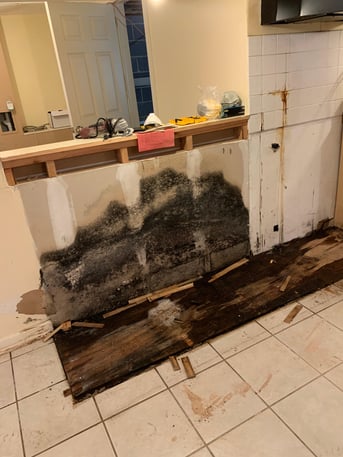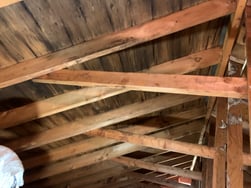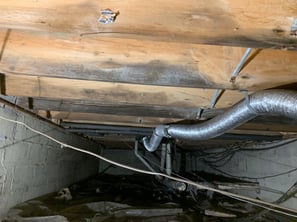Black Mold, the most feared and vilified mold, isn't even a real mold. Black mold is a name that was made up by the media and mold industry to invoke a response from you. That's right, misinformation at its best.
 Do not buy into the Black Mold Myth. If black mold was real, do you not think there would be other molds named after colors? Like white mold, grey mold, and even pink mold, because those colors of mold all exist too. There are no molds named after colors, molds, for the most part, have hard-to-pronounce names, so having them named after colors would certainly make them easier to pronounce. There are many different molds that are black in color and to have a mold identified, a sample goes directly to a laboratory where they look at the mold sample under a high-powered microscope for spore/fungal identification. What does that tell you? Well, no one who looks at mold with the naked eye cannot tell you the spore type, just isn't possible (maybe they can guess).
Do not buy into the Black Mold Myth. If black mold was real, do you not think there would be other molds named after colors? Like white mold, grey mold, and even pink mold, because those colors of mold all exist too. There are no molds named after colors, molds, for the most part, have hard-to-pronounce names, so having them named after colors would certainly make them easier to pronounce. There are many different molds that are black in color and to have a mold identified, a sample goes directly to a laboratory where they look at the mold sample under a high-powered microscope for spore/fungal identification. What does that tell you? Well, no one who looks at mold with the naked eye cannot tell you the spore type, just isn't possible (maybe they can guess).
How about when people want to know if the mold they have is Bad Mold? Well, a bowl of mixed nuts would be the bad nuts for anyone allergic to nuts. The same thing goes for dairy, if you are allergic to dairy, the dairy aisle of the supermarket is bad. My point being is the mold that affects you, is the bad mold. But let's be clear, Mold is not a benefit when found inside a home or building.
Now, this article will certainly not be looked upon favorably by the mold remediation industry, as they want people afraid, misinformed, and motivated to get the mold problem fixed. I once gave a talk at a convention and spoke about how black mold is a misused term. Well after the talk I had a gentlemen come up to me and asked why I would tell people that Black Mold was not real. He was of the idea that scared people spend money and the term Black Mold Scares people. I speak about incorrect perceptions of the environment all the time and I don't like people being misled by the term Black Mold.
 To put mold into laser focus, if you have mold, you don't have a mold problem, you have a water/moisture issue. Mold is the by-product of the water issue. So when you remediate mold (mold removal is called remediation) you better fix the water issue or it will come back. And yes, we remediate mold and have had to remediate sites where mold was previously remediated but the water issue was not resolved.
To put mold into laser focus, if you have mold, you don't have a mold problem, you have a water/moisture issue. Mold is the by-product of the water issue. So when you remediate mold (mold removal is called remediation) you better fix the water issue or it will come back. And yes, we remediate mold and have had to remediate sites where mold was previously remediated but the water issue was not resolved.
Now, I do not wish to ignore the health issue associated with mold. The EPA considers mold an indoor air contaminant, and rightfully so. You can inhale a live or dead mold spore and have a reaction from it. Mold off gases when mold is growing this produces mycotoxins and microbial volatile organic compounds (MVOC). You may say you smell musty odors, but you are really smelling this off-gassing mold metabolism. These compounds can also have an adverse effect on your health. So to be clear mold will adversely affect indoor air quality and while you may be mold resistant, we have seen people move into new offices and homes with mold and after a period of time, they find mold is affecting them.
 Let me go even further into the mold. I think we can agree that mold is not a selling feature for real estate. If you have mold and there is an exposure pathway, meaning you are going to encounter it, (I give a pass to mold growing outside your home) the mold should be remediated. I say should there is no law saying a home or office must remediate mold, but doing so is generally considered a positive thing. The issue with addressing mold is the Standard of Service (SOS) you receive. The rub with mold remediation is there are no federal laws regulating mold and at the time of this article only 11 states have mold regulations, so chances are if you have a mold problem you are in an unregulated state. What does that mean? It means that the company or individual you hire holds no state license and there is no SOS they must follow. I say this because I live it.
Let me go even further into the mold. I think we can agree that mold is not a selling feature for real estate. If you have mold and there is an exposure pathway, meaning you are going to encounter it, (I give a pass to mold growing outside your home) the mold should be remediated. I say should there is no law saying a home or office must remediate mold, but doing so is generally considered a positive thing. The issue with addressing mold is the Standard of Service (SOS) you receive. The rub with mold remediation is there are no federal laws regulating mold and at the time of this article only 11 states have mold regulations, so chances are if you have a mold problem you are in an unregulated state. What does that mean? It means that the company or individual you hire holds no state license and there is no SOS they must follow. I say this because I live it.
We get calls from all over the country regarding mold and entities they are dealing with and are less than satisfied. Complaints range from a company doing mold testing and not providing a written explanation of the test results. You see without federal regulation, there are no acceptable or unacceptable mold testing standards. There are Industry standards, but oftentimes the company doing the work does not explain them or provide their interpretation in writing. My belief is most people doing mold work don't know what they are doing and they get away with it because the client knows even less.


